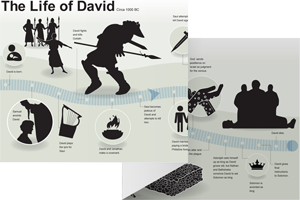18:1–5 Saul’s son Jonathan quickly befriends David. Jonathan was loyal to David until his death, and David honored his commitments to Jonathan even after his friend had died. Their friendship is an example of loyalty in the midst of fierce opposition. |
18:1 as his own soul Demonstrates that the men were like-minded in their observance of God’s Law and zeal for Israel.
18:2 did not allow him to return to David was forcibly conscripted into service.
18:3 a covenant with David The establishment of a covenant demonstrates the commitment between David and Jonathan. Also, a covenantal context provides the lens for understanding the love between Jonathan and David.
demonstrates the commitment between David and Jonathan. Also, a covenantal context provides the lens for understanding the love between Jonathan and David.
 Covenants in the Old Testament Table
Covenants in the Old Testament Table
18:4 robe May describe a royal robe, or something indicative of his status as the king’s son. Monarchs in antiquity were often identified by their clothing (see Matt 6:29). His gift of royal clothing and weaponry may symbolize an attempt to transfer the kingdom to David.
18:5 whenever Saul sent him, and he succeeded David’s success becomes a contributing factor to Saul’s jealousy and thus heightens the contrast between David’s rise and Saul’s demise.
18:6–16 This section returns to the narrative framework of 1 Sam 17. Upon returning home from successfully routing the Philistine forces, Saul hears women singing David’s praises. He immediately becomes jealous and suspicious. The narrative presents Saul’s first two attempts to kill David. |
18:6 When they were coming back Perhaps to Gibeah of Saul, the royal residence.
to meet King Saul Celebrating the homecoming of the victorious king was a common custom (compare Matt 21:10 and note).
18:7 David his ten thousands This chorus celebrates David in the face of Saul. In antiquity, kings, not soldiers, received credit for battle.
18:8 Saul became very angry Saul’s anger comes directly from the celebration of David.
18:9 Saul was watching David with suspicion from that day onward For the rest of his life, Saul will view David with suspicion or outright hostility.
18:10 the evil spirit from God See 1 Sam 16:14 and note.
spear was in Saul’s hand The narrative often portrays Saul as being close to his spear (see 19:9; 22:6). The king’s spear seems to be used as a symbol of Saul’s madness and paranoia.
18:11 David eluded him twice David apparently shows great loyalty. Even after Saul had thrown the first spear, David continued to play his lyre to ease Saul’s madness.
to ease Saul’s madness.
18:12 was threatened by the presence of David See vv. 29; 10:22 and note. Saul’s anger toward David is accompanied by fear, which stems from his awareness that God was with David but not with him.
18:13 made him commander of Saul may hope to bring about David’s death in the natural course of battle. However, because God was with David and not with Saul, this plan backfires (see vv. 14, 16).
18:14 David was achieving success David’s success in battle resulted in great gains for Israel. David also gained respect among Israel’s military leadership, the devotion of the army, and the love of the people.
18:16 all of Israel and Judah Even early in his career, David was a charismatic leader who united the country through his military achievements.
18:17–30 This section records Saul’s further attempts to kill David. Twice Saul encourages David to marry one of his daughters; he hopes that, through these marriages, he might rid himself of the increasingly popular hero. David initially refuses, stating that he is poor and cannot afford the dowry. However, when Saul indicates that the bride price is dead Philistines, David accepts the challenge and marries Saul’s youngest daughter, Michal. |
18:17 the hand of the Philistines Saul attempts to lure David into a more dangerous military role by offering him his daughter, Merab, in marriage.
18:19 to Adriel the Meholathite as wife Unlike v. 25, no further negotiations occur between Saul and David; the king gives Merab to another man.
18:21 a snare for him Saul may view Michal as a snare because she practices idolatry (see 19:13) or because Saul uses her to lure David into a more dangerous position (see v. 17 and note).
18:23 I am a poor and lightly esteemed man See v. 18 and note.
18:25 a hundred foreskins of Israelites removed the foreskin in the ritual act of circumcision (see Gen 17:10–14). This identified them as participants in God’s covenant. Those who were uncircumcised, and therefore outside the covenant, were an object of the Israelites’ derision (e.g., 1 Sam 14:6; 17:26; 31:4).
(see Gen 17:10–14). This identified them as participants in God’s covenant. Those who were uncircumcised, and therefore outside the covenant, were an object of the Israelites’ derision (e.g., 1 Sam 14:6; 17:26; 31:4).
allow David to fall Saul’s fourth attempt to kill David (see 16:21 and note).
18:26 the matter pleased David David was pleased that he would be able to kill Philistines.
18:27 struck down two hundred men of the Philistines David provides double the bride price (v. 25).
Michal his daughter as his wife Saul’s plan to have David killed by the Philistines did not work (see v. 25).
18:29 Saul was threatened by David still more See vv. 12; 10:22 and note.

|
About Faithlife Study BibleFaithlife Study Bible (FSB) is your guide to the ancient world of the Old and New Testaments, with study notes and articles that draw from a wide range of academic research. FSB helps you learn how to think about interpretation methods and issues so that you can gain a deeper understanding of the text. |
| Copyright |
Copyright 2012 Logos Bible Software. |
| Support Info | fsb |
 Loading…
Loading…


